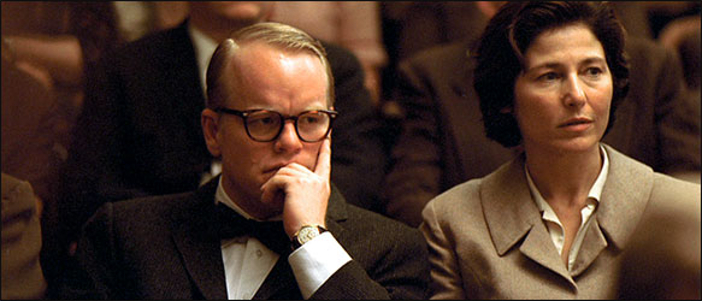Journalism on Film | 2 | The Failure of Objectivity in Capote
HeadStuff is currently publishing a series of weekly articles on how the journalistic process is depicted on film – the intense research involved in the practice, the time it takes to articulate a story, and the false intimacies that come with the interview process. In our first entry, Andrew Carroll wrote about the raw humanity in The End of the Tour. In this, the second entry in our series, Richard Drumm looks at the failure of objectivity in Capote.
In Capote, we repeatedly hear people tell the titular character that his book isn’t just good, but will in fact likely change the face of literature and journalism. It will change how people write, as one character tells him. While it’s hard to point at ‘In Cold Blood’ and emphatically say that this one piece of literature is ground zero for our modern culture’s trend of news-as-entertainment, our obsession with figures like Louis Theroux and their intimate portrayal of controversial figures, or the endless hack documentaries that all follow the same beats to give a ‘narrative arc’ to the creation of real-world villainy, Capote makes a compelling attempt at it.
Following Truman Capote (the late, great Philip Seymour Hoffman in one of his deepest-dive performances), the film recounts the writing of ‘In Cold Blood’ and the years of obsession and depression which Capote experienced in trying to tease out the real story of the murderers, and the lack of life’s neat resolution when the constant stays of execution denied him a clean ending to his book.
It’s hard to point at ‘In Cold Blood’ and emphatically say that this one piece of literature is ground zero for our modern culture’s trend of news-as-entertainment, our obsession with figures like Louis Theroux and their intimate portrayal of controversial figures … Capote makes a compelling attempt at it.
As a depiction of journalism itself, the film undeniably errs on the glamorous, celebrity side of the lifestyle by featuring an endless parade of sophisticated parties with besuited drunkards fawning over Capote’s every word and guffawing riotously at his every lewd witticism or self-aggrandising anecdote. The kind of scenes you’d usually see as the intro-moment for a villain in a Bond film appears to be how Capote lived his every non-working hour. The film does an excellent job, however, of demonstrating why he was such a formidable journalist when it came to gathering information. We’re repeatedly told and shown how his near perfect recall means he’s basically a sentient, flamboyant recording device. This seems to have been the key to how he ingratiated himself with important players in the case. The lack of a need to carry around a pen and paper or to be constantly noting what someone was saying meant he never needed to be ‘off’; he was perpetually charming even the most impenetrable of officials and gently probing them for vital insight once they felt sufficiently at ease or enthralled by his presence.

The film makes it clear that the moment Capote’s interest in the case transformed from wanting to write an article about a particularly gruesome and seemingly random act of savagery, and became the basis for a book about humanising and understanding those that committed the murder, was the moment he laid eyes on Perry Smith and became infatuated with him. His interest could definitely be said to have crossed professional lines as he hired new lawyers for them, bribed his way into endless access to their cells and gained extended, close contact with Perry. As the film progresses, there is a suggestion that all the warmth and compassion he showed toward Perry could well have been part of the act, part of veneer he often donned in order to get close to a subject and certainly once he finally has the gory details of the night of the crime relayed to him, his interest and sympathy seems to dissipate while he waits for the men to die so that he can complete his work.
Certainly, if you look at the original film adaptation of ‘In Cold Blood’, it seems to follow this arc of sympathy. Capote’s clear compassion for the men turning a large chunk of the tale into a highly sympathetic and at times quite enjoyable road trip. Once the details of the murder are finally recounted though, the tone shifts and your sympathy wanes as you see the more monstrous elements of humanity.

The early portions of Capote make it clear that this story was just work – Capote and fellow author Harper Lee visit various locations and talk to relevant parties. These scenes are quiet and washed-out; there’s little dialogue or action and when there is, it’s largely in the form of Lee and Capote trying to have fun or acting like their investigation is more like a game than serious work. The scenes of their actual downtime show them enjoying themselves on their little vacation-work-assignment as Capote gathers materials for an article. Once Perry enters the story this all changes. Suddenly, it’s going to be a full book and Capote is putting his personal relationships, and increasingly his own mental well-being, at stake to gain more insight into Perry. The sympathy Capote feels toward him allows Perry to indulge in sob stories and anecdotes – even his own sister warns Capote that her brother is a consistent manipulator. All the while, we watch as he neglects his romantic partner, author Jack Dunphy, and eventually can’t even bring himself to celebrate one of his closest friends in her massive success as he’s too absorbed in his story, his subject and himself.
It is this clear lack of objectivity or dispassionate reporting that does raise the most interesting central issue, journalistically, about Capote: the more interesting story comes at the cost of true objectivity.
It is this clear lack of objectivity or dispassionate reporting that does raise the most interesting central issue, journalistically, about Capote: the more interesting story comes at the cost of true objectivity. While he still reported the truth, there was inescapable idealisation of it that would have come from how close he grew to Perry – to say nothing of the implied but heavily downplayed romantic/sexual desires he felt towards the doomed criminal. Ultimately, is it acceptable to get too close to a subject in order to tell a better story, to make the truth more entertaining at the risk of blurring the lines somewhat? As we enter a fresh wave of such discussion with podcasts like ‘S-Town’ (and its infamous predecessor Serial), the question is one media and the consumers still grapple with.
[arve url=”https://www.youtube.com/watch?v=cjvBYqp8b6U” mode=”normal” align=”center” autoplay=”no” maxwidth=”750"]

